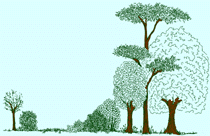 |
||
|
There is an essential hypocrisy in many of the choices we make: saving whales but over-fishing Atlantic fish stocks; campaigning to save native plants but allowing livestock to degrade our habitats; preserving woodland from road schemes and yet we buy packaged goods and daily newspapers; promoting organic food, but seeing 80% of it imported; expecting to reduce climate change by limiting resource use, rather than also actively seeking sustainable replacements before the urgency overtakes us. Pragmatism does have its place – less clean water would be used by flushing a toilet only when absolutely necessary (and with reduced volume) rather than hoping that we will all start to use waterless composting toilets. And it is this analytical thinking, this balancing of worse evils that is probably our best hope of bringing about any beneficial change. Pragmatism is our best hope because our hypocrisy often stems from lack of knowledge. But it is also because we don’t seem to have any direct control over the choices laid before us. Thus we take for granted production processes and become helpless in the face of distribution and marketing systems. But if we stand back and give ourselves the space to think more freely, we may be able to throw off the seeming impossibility of challenging what we face, and get a better understanding of what we can do. What this can mean in practice is that if we take more personal responsibility for our needs, we would almost certainly face simpler choices about the resources we use. We would then be more directly connected to their use and, ultimately, to the natural world from whence they came. When Bill Mollison was working in the wildscape of Tasmania, or Thoreau was contemplating Walden during his American woodland experience, they were both much closer to the resources on which they survived and faced only the simple choices of existence. They could learn how to shepherd and make best use. This led Mollison to devise some ground rules of resource use, based on his experience: RULE OF NECESSITOUS USELeave any natural system alone until, through strict necessity, we have to use itDoing things out of necessity is probably the most deliberate choice we ever make. Do we have to use it? Is there an alternative? Why start to use it when, with a little effort, we might find a different way to do it or could use something else. Thus we do not make the decision lightly and, having taken the decision, we must then think very carefully about that proposed use. Mollison gives us some more guidance:
Mollison saw that in applying these ground rules, we would realise how interconnected we are with nature and thus the self-interest of human survival was also to ensure the survival of natural systems – peoplecare being linked with earthcare. As we will constantly see in Permaculture, many of its goals are better achieved when we develop stability and permanence in our land and society. The trees in forests can last hundreds of years needing generations of care and knowledge. For this continuity, success comes from stable communities that value forests and who seek to hand on knowledge from generation to generation. We would now all accept the need to replace what we take from forests, often planting five trees for every one that is felled. We should also use this logic in all other situations because nature should expect a return for every gift that we receive. We must take responsibility so that, as a condition of use, we must replace an equal or greater amount than what we take. Carbon-based energy is a depleting resource that is simpler to conserve than it is to replace. We cannot suddenly produce more coal and oil, but we can insulate our homes against heat loss, which helps in conserving dwindling fossil fuels. But if we think more carefully, there are some energy resources that we can use WITHOUT them ever being depleted – they are unchanged by our use of them! We can generate electricity from the sun, wind and water with the technology involved becoming more efficient and accessible by the day. And there are low technology routes such as heating our homes and water through passive solar gain, and using the wind to turn machinery and pump water. This shows us that there are many different types of resource, and we can group them together based on what effect their use has on them, and what may result from their use: 1. THOSE WHICH INCREASE WITH MODEST USE - coppicing, cut and come again salads, browsing by wildlife, freely used and exchanged knowledge 2. THOSE UNAFFECTED BY USE - sun, wind and water 3. THOSE WASTED OR DEGRADED IF NOT USED – wasted rainwater, ripe fruit, unharvested crop 4. THOSE DEPLETED BY USE - coal, oil, gas, clay deposits, mature forests 5. THOSE WHICH POLLUTE OR DESTROY IF USED - agrochemicals, radioactivity, large areas capped by concrete or tarmac A mature society manages the resources in 1 to 4 wisely, and thus may never need to use those in category 5. Mark Fisher - Permaculture Design course handout notes www.self-willed-land.org.uk mark.fisher@self-willed-land.org.uk |